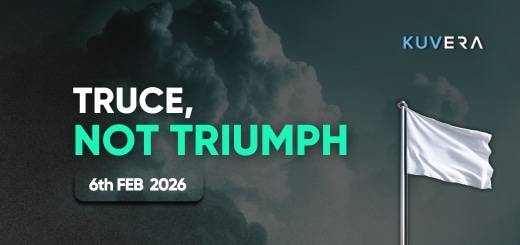
tl;dr Hear the article in brief instead?
What goes up, must eventually come down. This metaphorical expression describes not just Newton’s law of universal gravitation but also the concept of cycles and balancing forces in life in general.
So, when the Reserve Bank of India’s monetary policy committee cut the repo rate on Friday, few on the street were surprised at the decision to lower interest rates. After all, rates had first been inching up through 2022 and 2023, and then remained perched through 2024. Something finally had to give.
In fact, this is the third consecutive reduction in the central bank’s lending rate this year. Overall, the RBI has now cut its repo rate by 100 bps, making it cheaper for businesses as well as home and car buyers to borrow.
The RBI didn’t just stop at the rate cut. It also announced a 100-bps cut in the cash reserve ratio—from 4% to 3%—over four tranches starting September. This will free up to Rs 2.5 trillion in additional cash, enhancing banks’ lending capacity.
What was surprising, however, was the decision to slash the repo rate by 50 basis points (bps), to 5.5%, instead of the widely expected 25-bps reduction, as well as the CRR cut at the time when banking system liquidity is already in surplus.
The decisions by the RBI come amid a steady decline in retail inflation, which has eased from 3.34% in March to 3.16% in April, well below the central bank’s comfort level of 4%. The RBI also wants to do its bit to boost economic growth, which slowed to a four-year low of 6.5% in the year ended March 31, 2025.
The RBI said it remains largely upbeat on the country’s economy, which it expects will grow by 6.5% in the current financial year. Moreover, the RBI retained its quarterly Gross Domestic Product (GDP) growth projections for 2025-26 at 6.5% for Q1, 6.7% for Q2, 6.6% for Q3, and 6.3% for Q4—unchanged from its previous estimates.
The twin cuts boosted stock markets and investor sentiment. But here’s the twist.
Before the policy, market watchers expected the RBI to take more steps in the coming months to boost economic growth if inflation remained at benign levels. Now, the path ahead is not as certain.
This is because the RBI unexpectedly shifted its policy stance from accommodative to neutral. This change comes barely two months after it had shifted to an accommodative stance from neutral in its April 9 policy review.
What explains the RBI’s quick about-turn?
“Spillovers emanating from protracted geopolitical tensions, and global trade and weather-related uncertainties pose downside risks to growth,” RBI Governor Sanjay Malhotra said.
In its statement, the RBI said that monetary policy is now left with “very limited space” to support growth. “The fast-changing global economic situation too necessitates continuous monitoring and assessment of the evolving macroeconomic outlook,” it said.
So, what does all this mean? For you, it means that your car and home loan EMIs will go down. On the flip side, your fixed deposit interest rates will come down.
At a broader level, it means banks will have more money to lend—at a time when demand for credit remains tepid! This can have adverse consequences, some analysts say, especially if banks push unsecured or risky loans.
And what does the change in the RBI’s stance mean? Effectively, the RBI has indicated a pause in the rate cut cycle.
You gain some, you lose some. Life eventually comes full circle.

Electrifying Move
While the RBI just sought to make it easier for businesses to borrow, the Indian government is looking to electrify the country’s auto sector, quite literally. This week, the government unveiled a new policy that it hopes will attract foreign EV makers to set up manufacturing plants in India.
The new policy will allow global carmakers to import up to 8,000 EVs per year, for five years, at a reduced customs duty of 15% on high-end models costing $35,000 (Rs 30 lakh) or more, as against 70-110% they are currently required to pay.
This, provided they pledge an investment of Rs 4,100 crore (around $500 million) or more to set up plants in India. The carmakers will have to make the investment within three years of getting the approval from the government and will have to indigenise their cars by up to 50% in five years.
So, will global carmakers buy into this new policy? Well, news reports say that the likes of Mercedes-Benz, Volkswagen India and Hyundai are keen to manufacture in India. But Elon Musk’s Tesla is not interested and will import its cars directly from its plant in Germany. Also, China’s BYD appears out of the reckoning as the government has been cautious about getting investments from India’s neighbour owing to its close relationship with arch rival Pakistan.
Interestingly though, the policy is being unveiled as Vietnam’s VinFast is already set to start production at its new facility in India, and will introduce its affordable suite of EVs in the country later this year.
India’s own Big Four?
India, it seems, now wants to create its own Big Four. News reports say that the all-powerful Prime Minister’s Office (PMO) is exploring the possibility of setting up India’s own homegrown consulting firms.
This week, the PMO called a meeting to explore the possibility of local consulting companies that can match up to the Big Four – Deloitte, PwC, EY, and KPMG — to reduce reliance on foreign advisory firms and build global capabilities in the professional services space, the reports say. The PMO will assess the feasibility and craft a strategic roadmap for creating Indian consulting majors with global credibility.
Apart from former RBI governor Shaktikanta Das, those formulating the new strategy include Sanjeev Sanyal, member of the Economic Advisory Council to the Prime Minister, economic affairs secretary Ajay Seth, corporate affairs secretary Deepti Mukherjee, revenue secretary Arvind Shrivastava, and financial services secretary M Nagaraju.
The move comes as the Indian arms of the Big Four are seeing strong growth, buoyed by demand from both mid-market clients and government contracts. In FY24, the Indian arms of Deloitte, PwC, EY and KPMG posted a combined revenue of Rs 38,800 crore and are projected to surpass Rs 45,000 crore in FY25, reports say. This performance has outpaced the growth of some of their multinational parent entities.
The idea of building a domestic equivalent of the Big Four is rooted in the government’s larger vision of strategic self-reliance, especially in domains such as tax consulting, digital governance and infrastructure planning, news reports say.
Defending India
Meanwhile, in a big push to achieving self-reliance in defence, the Tata Group has inked a pact with France’s Dassault to make fuselages for its Rafale fighter jets in India.
This is being seen as a significant milestone in India’s bid to reduce foreign dependence in the defence sector as India’s air force operates two squadrons of the fighter jet and the navy has ordered 26 more. Moreover, the facility will also likely export fuselages to other countries whose air forces also have the fighter jet in their inventory.
In fact, news reports suggest that this deal may also indicate that the government could shortlist Rafale for a follow-on order of an additional 114 multirole aircraft that the Indian Air Force needs to shore up its depleting squadron strength.
Above all, it goes some distance in building indigenous defence capabilities in India, which remains one of the biggest arms importers in the world.

A Very Costly Spat
Just how much can a public spat with your ‘First Buddy’ cost you? Well, if you are the richest man in the world, and your ‘buddy’ is the president of the richest country on the planet, it can literally cost you billions of dollars. In fact, $150 billion to be precise, and counting.
Billionaire Elon Musk’s falling out of love with US President Donald Trump has led to a bloodbath on the markets, with shares of his flagship company Tesla going into freefall, down as much as 14%, on Thursday.
Market operators started dumping Tesla shares after disagreements between Musk and Trump quickly turned into a public spat, with the former saying the US president “should be impeached” claiming that the latter figures in the infamous Epstein files and that it is owing to that reason the details of the probe have not been made public. Musk’s bombshell remarks came just over an hour after Trump told the press that he was “disappointed with Elon” for opposing his ‘Big Beautiful Bill’—referring to a budget reconciliation bill in the US Congress that could add several trillion dollars to the national debt of the country.
So, how much worse can this spat get? Frankly, we don’t know and won’t hazard a guess. But here’s what we can say for sure—if better sense does not prevail and if their advisors cannot broker peace between Trump and Musk, things can go south, very fast. And that may not bode well for anyone.
Market Wrap
This was a good week for the markets and became even better thanks to the buoyancy following the RBI’s rate cut on Friday. While the Sensex ended the week up more than 1.5%, the Nifty did even better, rising nearly 1.7%.
The Nifty counters that led the market rally included Zomato’s parent Eternal Ltd, Dr. Reddy’s Laboratories, Jio Financial Services, Mahindra & Mahindra, Shriram Finance and HDFC Bank. Other gainers included Adani Ports, Bajaj Finance, Trent, Reliance Industries and State Bank of India.
Nifty stocks in the red during the week included HDFC Life, Tata Steel, Tata Motors and SBI Life. IT companies such as TCS, Wipro, Infosys and Tech Mahindra also ended lower this week.
Other Headlines
- Tata Capital likely to get SEBI approval for nearly $2-billion IPO.
- Drop 10% universal tariff in bilateral trade agreement, India tells US.
- TVS Motor appoints MD Sudarshan Venu as Chairman.
- Walmart-owned Flipkart gets NBFC licence from RBI; to begin lending from own books.
- Centre plans to sue e-commerce giants Amazon, Flipkart and Bigbasket for selling non-certified products.
- Apple gives Tata Group iPhone and MacBook repair business in India as partnership expands.
- Jindal Power, Adani Enterprises, Dalmia in fray for debt-laden Jaiprakash Associates.
- India plans rare earth magnet incentives as supply threat from China mounts.
- Actor Jeetendra Kapoor and family sell plot in Mumbai for Rs 855 crore to NTT Global Data Centre.
That’s all for this week. Until next week, happy investing.
Interested in how we think about the markets?
Read more: Zen And The Art Of Investing
Watch here: Investing in International Markets
Start investing through a platform that brings goal planning and investing to your fingertips. Visit kuvera.in to discover Direct Plans and Fixed Deposits and start investing today. #MutualFundSahiHai #KuveraSabseSahiHai










